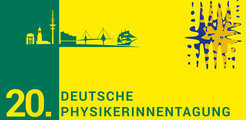Female physicists discuss the future in Hamburg
20th Women in Physics Conference under minister Johanna Wanka's patronage
From 3 to 6 November 2016, female physicists from all career levels in industry, economy and research will meet in Hamburg to discuss present research, trends and working situations of women in physics. The 20th Women in Physics Conference will take place under the patronage of Prof. Dr. Johanna Wanka, Federal Minister of Education and Research, who will also speak at the opening.

Hosted by the German Physical Society (DPG) and their associated working group on equal opportunities, the annual forum has been taking place since 1997. The anniversary event in Hamburg has been organized by the Department of Physics of the University of Hamburg and the cluster of excellence "The Hamburg Centre for Ultrafast Imaging" (CUI). Johanna Wanka: "The anniversary is a nice occasion for looking back at the last two decades’ road to success. During that period many women have been thrilled about physics. The percentage of women studying physics or astronomy at universities and universities of applied sciences has increased continuously: from 18.3 percent in the year 1995 up to 31.7 percent in the year 2014. The percentage of female graduates has almost doubled during the same period. I’d like this dynamics to continue. Physics is an important basis for technological developments and thus for economical progress in our country. Also in future we will need the valuable contributions of women for pushing innovation processes."
Traditionally, about 200 women are participating in the conference, which this year will take place on the research campus Hamburg-Bahrenfeld in the middle of DESY’s highly developed X-ray and electron sources as well as laser physics facilities. Prof. Petra Rudolf from the University of Groningen will give the scientific opening speech. In a panel discussion, Hamburg's Senator for Science, Research and Equality, Katharina Fegebank, together with other guests will debate paths to gender equality in the natural sciences. The public evening lecture with Prof. Margarete Mühlleitner from the Karlsruhe Institute of Technology will be another highlight. The scientific program will be accompanied by a visit at the Hamburg Observatory, a play about the famous female scientists Marie Curie, Lise Meitner and Hedy Lamarr, and a broad program for female pupils. About 80 schoolgirls from almost all grades may experiment in seven laboratories of DESY and CUI’s school lab "Light & Schools".
All women who feel related to physics – no matter if they are pupils, lecturers, researchers or economic physicists – are invited to attend the conference, and so are men who can identify with the conference’s aims. "We are very happy to organize this vivid and diverse conference and thus make another contribution to networking," says CUI board member Dr. Melanie Schnell. "Thank you to all the groups on campus who were involved in the organization."
The conference is supported by the Deutsches Elektronen-Synchrotron (DESY) and the Max Planck Institute for the Structure and Dynamics of Matter (MPSD), as well as the Collaborative Research Centers 676 and 925, and PIER, the strategic partnership of DESY and the University of Hamburg.
